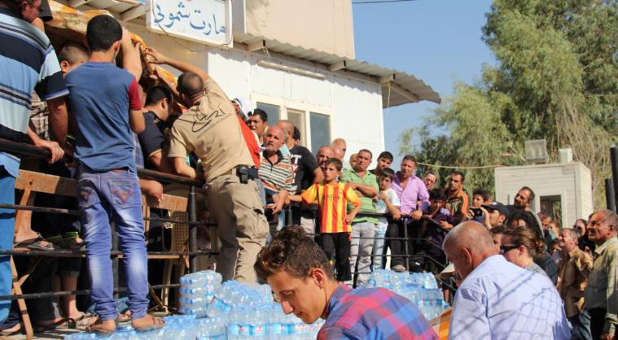How Christians Can Help With the Humanitarian Crisis in Iraq
Q: How has this Iraq crisis been different from other crisis situations your teams have encountered?
Sean Malone: The Iraq crisis is different from other situations because war and terrorism is a trauma on a completely different level. Another difference is that the war is ongoing, and so security of the teams is a priority.
Our teams have experience in caring for survivors dealing with grief and loss in natural disasters, but in the face of the atrocities of war the issue of forgiveness is seen more clearly as essential to healing and moving forward.
Q: What are some of the unexpected challenges now facing both aid organizations and government agencies as they’re trying to provide relief in the midst of terror?
Malone: The size of the crisis is something that is an unexpected challenge as even the U.N. is having difficulty keeping pace with the ongoing crisis. The amount of people that are in need of basics survival needs is overwhelming. Keeping in mind that in May there were around 230,000 Syrian refugees in the Kurdistan region still in need of aid. Now there are over 1 million refugees—Syrian and Iraqi in the Kurdistan region. Right after the Mosul situation, there was a serious gas shortage as ISIS cut off the normal gas routes as they controlled the plant in Beiji. Many people were forced to spend the night in gas lines that at times were over a mile long. This slowed the efforts of our team at times.
There are also thoughts about security as we offer care to refugees. There can easily be ISIS sympathizers among those who are offering care. So now aid workers have to be even more aware on site.
Q: You’re partnering with churches to mobilize and train responders worldwide with over 2,500 responders trained now. What is the biggest challenge in getting people involved?
Malone: Yes, our responder base is growing, and I think the greatest challenge now is to find those who are willing to go to dangerous destinations. The opportunity is great to affect many with the love of God, but the choice must be made to follow the example of Jesus and be willing to lose our lives for the sake of others.
Q; What are you hearing from the responders on the ground in Iraq? How can people pray and support them?
Malone: Our responders on the ground continue to share that the need is great but so is the opportunity. On a daily basis they are able to care for the physical and emotional needs of refugees, which opens the door to care for their even greater spiritual needs. There have been opportunities to share about the love of Jesus, hand out Bibles and even show the Jesus film. We have now had a great door of opportunity opened to us as we have access to caring medically for Kurdish soldiers on the front lines. We have also been able to help teach them basic life-saving skills that will help them care for themselves and others on the field, and give them medical kits and basic supplies or “morale bags” so they know they are not forgotten.
Prayer requests are: For continued team unity and cohesiveness as responders rotate in and out. That we would be sensitive to God’s leading in where our teams go and what projects we focus on. That the love of Jesus flow from our teams and that we would have more opportunities to speak of Him. For continued provision of resources that they would be tools to show the love of God. That God would continue to use our teams to bring healing and hope. For continued protection of our teams.
Q: Can you share any testimonies of how God is at work in the midst of this?
Malone: The biggest testimony is that due to the ISIS crisis, many people groups and communities that were closed to the gospel before are now wide open. As there are many Yazidi, Shabak, Muslim and “Christian” refugees that are desperate for help and so open to those who give it. I believe the harvest is ripe as Jesus said, and the need is for laborers to come and love with His love. We have seen walls come down between the Catholic and evangelical churches as they have been working together to bring aid. These groups previously had a large wall of division. Our team has had many people say that as soon as they saw us they felt peace and knew they wanted to invite us in. They said we were different from other aid organizations because they felt loved by us. As we have prayed, we have seen pain leave many, and one boy who was not able to walk was able to run! We have seen many discouraged and heavy hearts made lighter. In the midst of darkness we see the light of Jesus bringing peace, healing and hope. The need continues to be great and will be for a while, but so is the opportunity.
If anyone would like to give toward the deployment, they can go to www.criout.com and select Kurdistan Deployment in the scroll box. Funds go to purchasing supplies for refugees and for caring for Kurdish soldiers on the front lines.
If anyone would like to deploy with is here in Iraq and they are not already a CRI responder, they can go to www.criout.com and see about upcoming training opportunities.
Sean Malone is director of Crisis Response International based out of Nashville, Tennessee. CRI is a 501 (c) (3) nonprofit organization that resources, trains and mobilizes volunteers, churches and other organizations to respond to disasters and compassion initiatives around the world.
Kyle Patterson is Chief Scribe at Thrive Media Group, a communications agency that serves a variety of nonprofits.




























































